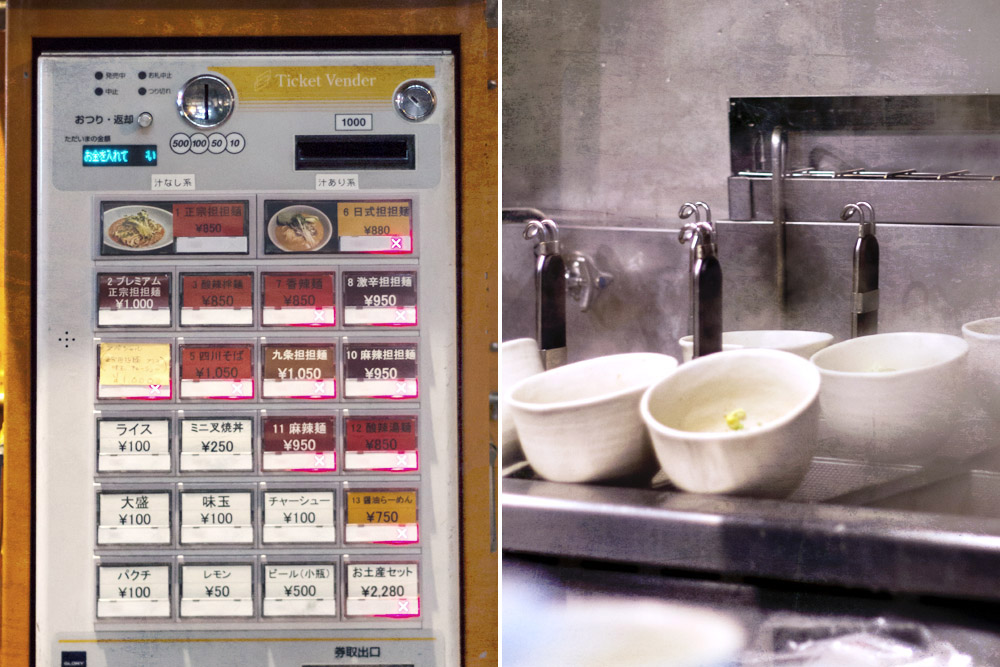COMMENTARY, Feb 18 — A bowl of ramen can impart more than an explosion of flavours upon our taste buds. Perhaps, if we are open to it, ramen tell us more about how we live.
It begins with patience. As you join the queue to enter the ramen shop, you could be fidgeting about the agonising wait. Like a child on a road trip with no end in sight, you call out “Are we there yet?” if only to yourself.
Or you could observe how the others in the line behave. Most are happily engaged with some form of active distraction: chatting with friends, eyes stuck to their phones or indulging in a bit of people watching, i.e. fellow diners and passers-by.
One or two are simply looking ahead, their full attention concentrating on the meal ahead once they cross the threshold. This is what they envision:
Finally reaching and standing right in front of the doorway. Entering the shop and being greeted by the staff. Irrashaimase! “Welcome to our shop!”
Selecting their ramen of choice from the vending machine. Passing their ticket to one of the staff. Sitting down once it is their turn. In smaller shops, the queue continues inside, standing space behind diners who are already eating.

Every step is replaced by the next, like clockwork. Everyone knows the score.
Yes, there is a lot of waiting.
Yet even before you step foot into the ramen shop, there has already been hours of preparation. The painstaking making of the broth — from washing the bones to soaking and simmering the konbu seaweed to produce a clear dashi.
The cleaning of the kitchen, the counter space, the tiny stools. Checking to ensure every container has been refilled — chopsticks, serviettes, jugs of iced water, seasoned oils, vinegar, seven-spice shichimi — so no customer may be left wanting.

The vats of boiling water to cook the noodles. Pouring hot broth on top of a spoonful or two of tare seasoning and allowing them to blend naturally in the bowl. Shaking excess water from the cooked noodles, a graceful and explosive athletic feat. Using large chopsticks to rearrange the strands of noodles just right.
The symphony, the dance behind the bar. Friendly chats between the ramen shop proprietor and his customers who are gregarious, and those who are left alone to eat in meditative silence. The unhurried nature of everything but also their brisk, efficient movements. Not a single action is wasted.
Take it slow. Good things take longer to happen than we would like, but they will come. And they will be worth the effort.
Your bowl of ramen finally arrives, and is presented to you with as much élan as the staff can muster before moving on to the next order.


You take a few seconds to take in the vision before you: Now this is beauty. Now surely this is perfection. A few seconds but no more than that. It’s time to eat while your ramen is hot.
First you breathe in the aroma. Then tentatively, a sip of the soup. Using the chopsticks as best you can, you guide some noodles towards your lips, slurp noisily to help cool them down. You do not intend to shame yourself and allow your meal to congeal.
Here, a bite of torched chashu or fermented menma. Meat and bamboo shoots. Divine. And you repeat the motions — sip, slurp, chew — till your bowl is clean.
Take it slow. Enjoy the moment. Fully absorb every aspect of it. Appreciate being here and not imagine being elsewhere. Because we are not elsewhere, are we? To insist on disengaging with the present is like arguing with reality. It won’t make us any happier.

Before you depart (and here we do not linger for it isn’t polite to let other hungry customers wait), you say “Gochisosama deshita” or “Thank you for the meal” in Japanese. The staff, seeing that you have politely, kindly, returned your bowl to the counter top — it’s the least you can do, you reckon — say “Osore irimasu.” I’m sorry to trouble you.
It’s no trouble at all.
For you are expressing gratitude not only for the delicious food they made for you but for the entire experience. The ambience and the seating, the warmth of the kitchen, the steam from the bowl of ramen, allowing you to forget the coldness that awaits you outside the shop, and be present for this one wonderful moment.
To be present, to breathe in the steam, the aroma, the flavours, and to be nowhere else but here. To be present and to be who you truly are, without apologies or regrets, and not anyone else.

Take it slow. For if we miss this moment, it will be gone forever. Author Tim Ferriss observed that time is a non-renewable resource. No one knows how much of it we have or have remaining. What we do know is the time we have right now, and what we choose to do with it.
To love ramen goes beyond an appreciation of the craft but also delight in receiving lessons in mindful living. For the patience it takes to boil a vat of collagen-rich bones for a day or two. For being fully present for the bowl of soup and noodles in front of you instead of playing games on your phone.
It is a remedy for our modern world where attention is scarce and peace of mind scarcer still. Take it slow.
For more slice-of-life stories, visit lifeforbeginners.com.






















